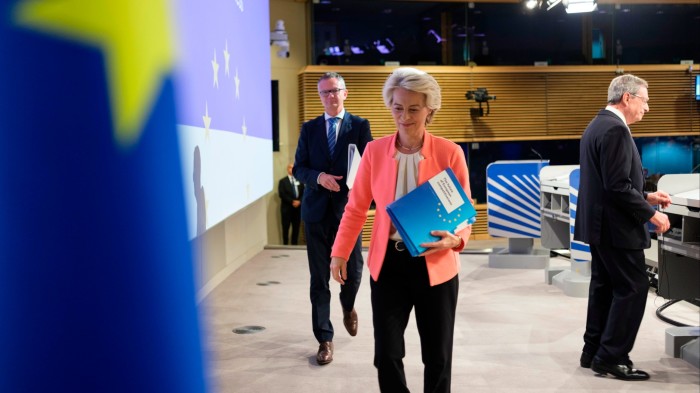Stay informed with free updates
Simply sign up to the EU economy myFT Digest — delivered directly to your inbox.
The writer is co-chief executive of the Itinera Institute, a Brussels-based think-tank, and the author of ‘Superpower Europe: The European Union’s Silent Revolution’
“We all know what we have to do, but we don’t know how to get re-elected once we have done it.” So said Jean-Claude Juncker back in 2007 when he was president of the European Commission. Fast forward to 2025, Europe’s new “Juncker curse” is that its politicians know what they have to do but don’t know how to pay for it. Call it, with reference to the current commission president, “Von der Leyen’s curse”.
No fewer than three major reports published last year — by Enrico Letta, Mario Draghi and Sauli Niinistö — urge European leaders to push ahead with deepening market integration, boosting innovation and investment in critical sectors and technologies, and with building self-reliance to face crisis and conflict.
This quest for prosperity, strength and security comes with an unprecedented price tag. Draghi alone advocates an additional €800bn in annual spending. Where is the EU supposed to find this kind of money and how can spending on such a scale be mobilised to support common priorities rather than narrow national preferences?
The most elegant solution would be massive public-private partnership schemes. In an ideal scenario the EU, together with the European Investment Bank, would make institutional investors and venture capitalists offers they cannot refuse: the ability to claim a stake in the economic and technological future of the continent with guaranteed government spending and/or protected market potential as a revenue model. But co-ordinating this from Brussels across 27 member states would be a Herculean task. Just consider how the much simpler common European defence bond has failed to materialise, despite the horrors in Ukraine.
Then there are taxes. An EU that raises import tariffs, emission levies and other taxes to make the playing field fair and sustainable in the European market can potentially invest tens of billions annually. However, taxes may be counterproductive if they hurt the very European industry we seek to keep and protect. And they may be downright destructive if they end up hurting companies from countries with which Europe does not want a trade war.
What is left are debt mechanisms. But the stability of Europe’s unfinished monetary union imposes preventive budgetary discipline on member states. Deficits for strategic investments remain possible, but require country-by-country negotiations with the commission. Mutualised European debt invested directly from Brussels is a political Rubicon member states still have to cross.
The EU not only has too few resources, it also does not know how to spend what it does have quickly and efficiently. Processes are slow, bureaucratic and generally not very transparent for participating companies or countries. The bloc must compete with China, Russia and the US in what has become a global arms race of state capitalism and mercantilism. But Brussels has neither the political nor financial heft to compete with Beijing, Moscow or Washington.
If the EU really wants to live up to its ambitions, the existing platform for important projects of common European interest can be a stepping stone, provided it can scale up and speed up. More likely is an ecosystem of investment initiatives and vehicles outside formal EU programmes, through coalitions of investors and/or member states.
First-mover advantage will play a role as countries with a stake in strategic sectors can claim future market share by contributing to collective EU ambitions. Poland, for instance, has been leading the pack in mobilising public spending for defence and security capabilities along Europe’s eastern border and in the Baltic.
This, then, is the way to lift Von der Leyen’s curse. Allow coalitions of states to combine in respective self-interest and in strategic partnership with their industries, taking state aid to a co-ordinated multinational level.
Forget the old separation of the European market and domestic state aid — the latter serves the integration of the former for geopolitical purposes. Forget the decision-making machineries that often stymie EU action and instead create room for ad hoc arrangements within the bloc’s overall strategy. And forget even the distinction between member states and third countries — what matters is the right geopolitical coalition in support of EU policies, and that includes a country such as the UK in matters of security and defence. Lifting Von der Leyen’s curse, it turns out, might even lift the Brexit curse as well.














